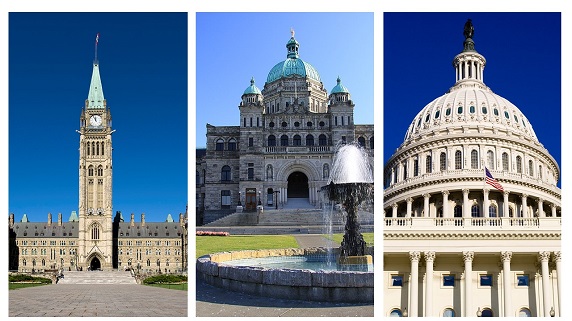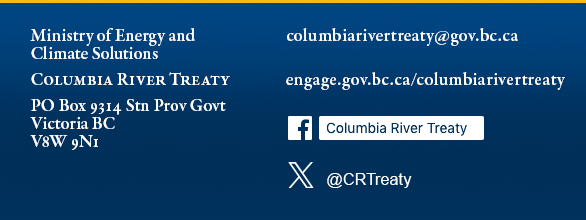Resources
Columbia River Treaty
Edition: December 2024

Message from the Honourable Adrian Dix

On November 18, 2024, I was appointed as Minister of Energy and Climate Solutions, as well as Minister Responsible for the Columbia Basin Trust, Columbia Power Corporation and Columbia River Treaty, in B.C.’s new provincial Cabinet.
The title is quite long, so it’s no wonder my predecessor in this role, Katrine Conroy, referred to herself as “Minister of All Things Columbia”. Katrine retired in September after seven years as Minister responsible for the Treaty and, before that, as the opposition critic. A resident of the Columbia Basin since childhood, she was a strong advocate for Basin interests.
It’s an honour for me to take on this role. The Treaty has been a critical part of the Columbia Basin, both north and south of the Canada-U.S. border, since it was ratified in 1964. It has, in some respects, been a great success, enhancing the generation of clean electricity and reducing the risk of damaging floods. It has also brought about impacts over the past six decades to those living in the Basin and to the region’s vital ecosystems.


From left to right: Parliament Hill, Ottawa, Ont.; Legislative Assembly of British Columbia, Victoria, B.C.; Capitol Hill, Washington, D.C.
Update on Progress Towards a Modernized Columbia River Treaty
It has been an eventful year in the process towards modernizing the Columbia River Treaty. With so much going on, we wanted to take a moment to recap recent milestones.
An Agreement-in-Principle is reached
After six years of negotiations, Canada and the U.S. reached an Agreement-in-Principle (AIP) in July, which paved the way for the countries to begin drafting amended Treaty text, and for B.C. to begin engaging with Basin residents to explain the AIP and seek feedback.
Engaging residents of the B.C. Columbia Basin
Since then, a significant amount of information has been shared with the public, explaining the new and updated elements outlined in the AIP, and how they create a framework for modernizing the Treaty to support communities and ecosystems across the Columbia Basin. The Province of B.C. hosted a virtual public information session in September, with representatives of the Canadian negotiating team providing an explanation of the AIP and answering questions on a range of topics. A recording of the session is available on the B.C. Columbia River Treaty website, along with an overview video, a backgrounder, the content of the AIP, and answers to frequently asked questions. Basin residents have been sending in feedback, questions and comments since July, which has been informing next steps in the modernization process.
Drafting amended Treaty text
At the same time, Canada, B.C. and Canadian Basin First Nations have been working with the U.S. to draft amended Treaty text in a way that reflects the AIP. Negotiators from both countries are working quickly and diligently to put into place a modernized Treaty that secures the new and updated provisions outlined in the AIP. The sooner a modernized Treaty comes into effect, the sooner it can be implemented to enhance ecosystems, salmon populations, Indigenous and Tribal cultural values and Basin communities.


Revelstoke Railroad Bridge across the Columbia River at Revelstoke, B.C.
Interim Agreements to Bridge the Gap
While the Agreement-in-Principle (AIP) is a key step forward towards modernizing the Columbia River Treaty, it is not a legally binding document. Until a modernized Treaty has been finalized and brought into force by both countries, the current Treaty remains in place.
To bridge the gap between the AIP and a modernized Treaty, the Canadian Entity (BC Hydro) and U.S. Entity (U.S. Army Corps of Engineers and Bonneville Power Administration) have entered into interim arrangements under the existing Treaty through exchanges of diplomatic notes between Canada and the U.S. to allow continued operations and implement some components of the AIP.
These arrangements will ensure:
- the Canadian Entitlement set out in the AIP will continue until 2044, securing predictable benefits to B.C. over the next two decades; and
- the pre-planned flood risk management operations as outlined in the AIP are implemented for a three-year period and ensure that B.C. is compensated as set out in the AIP.


Community Meetings in the B.C. Columbia River Basin
Engagement opportunities and submitting your feedback
The voices, concerns and perspectives of Basin residents continue to inform the Treaty modernization process. Here are some upcoming opportunities to learn more and make your voice heard.
Public virtual information session, December 19: The Province of B.C. will hold another public virtual information session on December 19, 6 - 7:30 p.m. PST / 7 - 8:30 p.m. MST to summarize key elements of the Agreement-in-Principle, share updates about progress towards Treaty modernization and answer questions. Register here. A recording of the session will be available after the session on YouTube and the B.C. Columbia River Treaty website.



